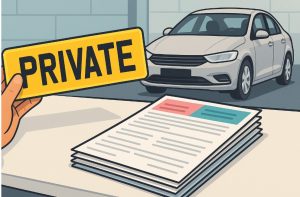Table of Contents
ToggleHave you recently changed your address, modified your vehicle, or sold your car? Are you wondering whether these changes require action from you as a vehicle owner? One of the most overlooked yet crucial responsibilities of being a registered keeper in the UK is knowing when you should update your vehicle registration certificate, also known as the V5C.
Failing to notify the DVLA (Driver and Vehicle Licensing Agency) of changes to your personal details or vehicle specifications can lead to legal consequences, financial penalties, and administrative delays.
In this article, we’ll explore the situations that require an update, how to make changes correctly, and the implications of non-compliance—all while helping you understand why this document is more than just a piece of paper.
What Is the Vehicle Registration Certificate (V5C) and Why Is It Significant?

The V5C, commonly referred to as the vehicle log book, is issued by the DVLA and acts as an official record of the registered keeper of a vehicle. It contains important information such as the vehicle’s registration number, make, model, engine size, fuel type, colour, and the name and address of the registered keeper.
Although it does not serve as proof of ownership, the V5C links a specific person to the legal responsibilities associated with the vehicle. This includes tax, MOT compliance, emissions obligations, and any penalties or enforcement actions.
An updated V5C ensures that you receive all necessary communication from the DVLA, such as reminders for tax renewals or penalty notices. It also helps prevent fraud by ensuring no one else can falsely claim responsibility for your vehicle or use outdated details for illegal activity.
Neglecting to keep your V5C up to date may not only result in missed DVLA correspondence but could also affect insurance claims and cause complications if the vehicle is stolen or involved in a legal matter.
When Are You Legally Required to Update Your V5C?
The DVLA mandates that registered vehicle keepers must update their V5C under certain conditions. These updates ensure the accuracy of the information held on record and maintain the integrity of the UK’s vehicle registration system.
You are legally required to update your V5C in the following situations:
- If you change your address, either permanently or temporarily
- If you change your name due to marriage, divorce, or legal documentation
- If you modify your vehicle in a way that affects its physical characteristics or identity
- If you sell or transfer the vehicle to another person
- If the vehicle is exported out of the UK
- If the vehicle is written off or scrapped
In all of these cases, it is your responsibility to inform the DVLA promptly. Ignoring this duty may result in fines of up to £1,000. In rare but severe cases, your driving privileges may even be suspended or revoked.
What Kind of Changes Require V5C Updates?
The DVLA provides clear guidelines on the types of changes that necessitate a V5C update. These are categorised into personal and vehicle-specific changes.
Personal Information Updates
If your name or address changes, your V5C must reflect the new information. This helps ensure you continue receiving communication from the DVLA and that you’re not held accountable for issues relating to your old address.
Vehicle Modifications
Several changes to the vehicle itself also require an update to the registration certificate. These include:
- A change in vehicle colour
- A replacement or modification to the engine
- Adjustments to the cylinder capacity (cc)
- A change in fuel type
- Alterations to the seating capacity
- Changes to the chassis or body shell
- Adjustments to the weight of large vehicles such as vans or campervans
Additionally, some modifications may trigger a DVLA inspection, particularly if they alter the vehicle’s structure or legal classification. For example, converting a panel van into a campervan or changing the body type may lead to a reassessment of how the vehicle is categorised.
Common Updates Requiring V5C Notification
| Type of Change | Update Required | Inspection Needed |
| Change of address | Yes | No |
| Name change | Yes | No |
| Engine replacement or modification | Yes | Possible |
| Colour change | Yes | No |
| Seating or weight adjustments | Yes | Possible |
| Conversion (e.g., van to campervan) | Yes | Likely |
| Change of ownership | Yes | No |
| Exporting or scrapping the vehicle | Yes | No |
How Do You Update the Vehicle Registration Certificate?
Updating your V5C is a straightforward process and can be completed either online or via post. The method you choose depends on the nature of the update.
Online Method

The fastest and most convenient way to update your V5C is through the official DVLA portal. You can use this method for simple updates such as a change of address. It typically takes around five working days for the updated document to arrive at your new address.
Postal Method

For changes involving your name or vehicle specifications (e.g., engine modifications, colour change), you’ll need to fill out the relevant sections of your V5C and send it to the DVLA by post. The processing time for postal submissions is usually four to six weeks.
If you’ve lost your V5C, you can request a replacement for a fee of £25. This too can be done online or by phone.
It’s essential to fill out the correct sections based on your log book version. For new-style V5Cs, name and address changes go in Section 3, while vehicle detail updates go in Section 1. If you are selling the vehicle, use the green new keeper slip (V5C/2) to transfer ownership.
What Are the Penalties for Not Updating Your V5C?
Failing to update your V5C on time can lead to more than just administrative issues. You risk receiving a fine of up to £1,000, and if the information mismatch leads to complications with your car insurance or tax, further legal penalties may apply.
In the worst-case scenario, your vehicle could be impounded or you could be accused of involvement in illegal activity if someone else misuses your outdated vehicle registration details.
Moreover, failure to receive crucial communication such as a speeding fine or court summons, could escalate into larger legal issues.
Some cases have even seen individuals required to reapply for their driving licence or retake parts of their driving test after repeated negligence.
Who Is Responsible for Updating the V5C?
The responsibility to update the V5C falls on the registered keeper listed in the document. This means:
- If you move to a new address, you must update your log book and driving licence.
- If you sell your vehicle, you must inform the DVLA and ensure the buyer completes their part of the V5C.
- If you buy a used car, you must complete the new keeper slip and submit it to the DVLA.
The DVLA does not automatically receive information from other government services like Royal Mail or the Home Office. Therefore, you must initiate the update yourself.
In situations involving company cars or leased vehicles, the leasing company or fleet manager usually holds the V5C. However, it is still your responsibility to inform them of any personal changes so they can update the document accordingly.
Do You Need to Update Private Number Plate Documents?

If you own a private registration number and it is not currently assigned to a vehicle, you will need to update your V750 (Certificate of Entitlement) or V778 (Retention Document) when you change your address.
This ensures the DVLA sends all relevant future correspondence to the correct location and prevents delays in reassigning the number plate to another vehicle.
Is It Always Obvious When a V5C Update Is Needed?
Not all situations that require a V5C update are clear-cut. For example, if you’re temporarily moving for work or education, you might be unsure whether a change of address is necessary. In these cases, it’s advisable to contact the DVLA directly for guidance.
While temporary changes may not legally require an update, it’s often safer to update your records or set up mail forwarding to avoid missing critical information.
What Role Does the V5C Play When Buying or Selling a Vehicle?
The V5C is essential in the transaction of used vehicles. As a seller, you are responsible for ensuring the buyer receives the relevant parts of the log book. As a buyer, reviewing the V5C confirms the identity of the registered keeper and allows you to verify the vehicle’s legitimacy.
It’s also crucial for applying for a tax refund, updating personalised number plates, and transferring ownership legally. If there is any discrepancy between the V5C and what the seller claims, consider it a red flag and conduct further investigation, possibly using a VIN check tool or a professional inspection service.
FAQs
What happens if I forgot to update my V5C after moving?
You may miss vital DVLA communications such as tax reminders or legal notices. This can result in fines or complications with your vehicle tax and insurance.
How long does it take to receive the new V5C?
It usually takes five working days if done online and up to six weeks by post.
Can I sell my car without updating the V5C?
While you can sell the car, you must notify the DVLA immediately. Failing to do so can leave you legally liable for anything the new owner does with the car.
Is it illegal to have the wrong address on my log book?
Yes, and the offence can incur a penalty of up to £1,000.
Does the V5C prove ownership of the car?
No. It shows who is responsible for the vehicle but not necessarily who owns it.
Will I need to retake my test if I don’t update my V5C?
Generally no, but persistent non-compliance could escalate and impact your legal driving status.
Can I update my V5C details at a post office?
Only some changes, such as address or tax-related updates, can be handled at certain post offices. Most changes should go directly through the DVLA.
READ NEXT:
- How to Start a Vehicle Rental Business in the UK?
- How to Use Personal Assets to Fund Your First Startup?
- DVSA Roadside Fines Payment Changes: What Drivers Across the UK Must Know in 2025?
- Rachel Reeves Car Tax Hike: How Will It Impact UK Drivers and the Economy?
- DVSA HGV Drivers Hours Rules Changes: What UK Hauliers Must Know in 2025?




